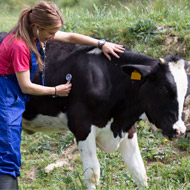
Twenty-seven per cent rise in cattle destroyed
Annual TB statistics, published by Defra last Wednesday (16 March), reveal a 27 per cent rise in the number of cattle slaughtered in Wales as a result of bovine TB.
The figures show that between December 2014 and December 2015, 8,103 cattle were slaughtered in Wales, compared to 6,378 the previous year.
Now farmers are calling for the Welsh Government to step-up their actions to fight the disease in both cattle and wildlife.
“Since 2008 over 68,000 cattle in Wales have been slaughtered because of this disease, this is despite the fact that Welsh farmers have adhered to stringent cattle movement and testing controls,” said Stephen James, president of NFU Cymru.
“This disease continues to cause untold heartache and stress to cattle farmers across Wales and places an enormous emotional and financial strain on farming families,” he continued.
“Whilst we recognise that the bovine TB picture is more complex than just looking at one statistic, these figures should make politicians from all parties in Wales sit up and take notice of the impact that bovine TB continues to have on cattle farmers in Wales.
“The new Government, following the May National Assembly elections, must come forward and be prepared to work with industry on a comprehensive plan of action that tackles this disease in both the cattle and wildlife populations.”
Mr James says a genuine TB eradication plan must include a strategy for dealing with the disease in wildlife in areas where it is endemic.
“The fact that there is a global shortage of BCG vaccine means that no politician or party can hide behind badger vaccination as their sole policy for dealing with the disease in wildlife,” he said.
“Ahead of National Assembly for Wales elections this May we have asked all parties to clearly set out their policy for dealing with the reservoir of infection in our wildlife populations.
“Our manifesto for the elections places a TB eradication strategy that removes disease from cattle and Wildlife as a key priority in helping us to achieve our vision of a productive, profitable and progressive Welsh agricultural industry. We will be looking for the new Government to take action as a matter of urgency.”



 FIVP has shared a survey, inviting those working in independent practice to share their views on the CMA's proposed remedies.
FIVP has shared a survey, inviting those working in independent practice to share their views on the CMA's proposed remedies.